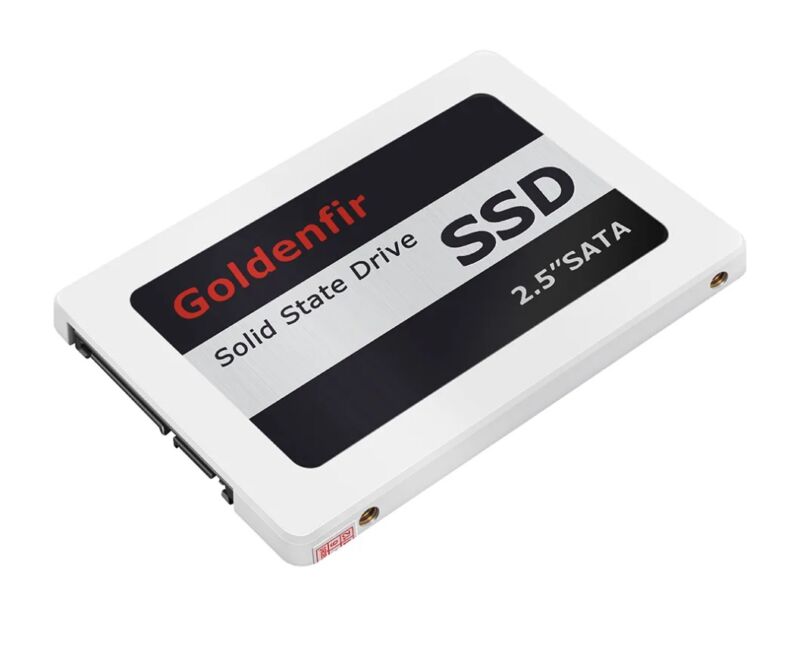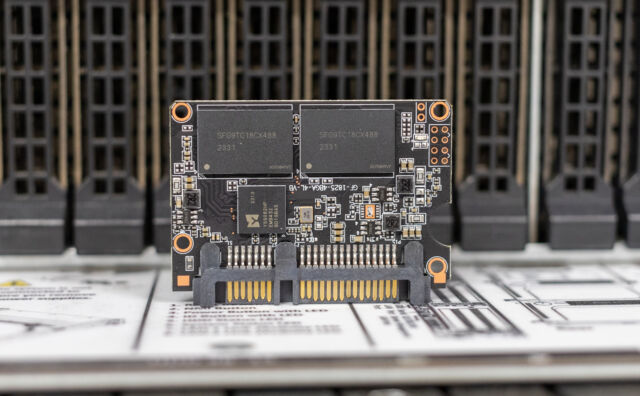

Reviewer tests $3 SATA SSD, gets exactly what they paid for
source link: https://arstechnica.com/gadgets/2023/10/reviewer-tests-3-sata-ssd-gets-exactly-what-they-paid-for/
Go to the source link to view the article. You can view the picture content, updated content and better typesetting reading experience. If the link is broken, please click the button below to view the snapshot at that time.

Too good to be true —
Reviewer tests $3 SATA SSD, gets exactly what they paid for
120GB "Goldenfir" SSD put through wringer by StorageReview.
Scharon Harding - 10/10/2023, 5:38 PM

As we've detailed here at Ars before, there are some sketchy SSDs sold online. They tempt the unsuspecting with supremely low prices, but in the end, all you're guaranteed is disappointing speeds. Heck, you might not even get solid-state storage—one popular scam passes off microSD cards as cheap SSDs. So what can you expect to get from a 120GB SATA SSD selling for $3?
StorageReview went through the remarkable journey of testing a $3 SSD from AliExpress (linking only to show the product listing. Don't buy this SSD, of course). The Goldenfir-brand SSD was reportedly given to the storage site by one of its Discord users for testing.
A real SSD
The good news is that Goldenfir is actually using an SSD controller for its NAND drive. The controller is a Yeestor YS9083XT, which the Chinese company announced as a SATA3.2 controller in 2019. And based on screenshots shared by the site, it has the advertised capacity.
Still, these drives obviously can't offer anywhere near the performance of a modern, normal-priced drive. Ars wouldn't recommend storing valued data on a drive from an unfamiliar brand. StorageReview also noted the drive's cheap-feeling, plastic chassis. And AliExpress lists supported operating systems as being limited to: "Windows XP / 7 / 2003 / 2008, DOS, Linux, and Unix."
However, StorageReview argued that in some very specific niche situations, the drives could have use, such as for "temporary, non-critical storage or for educational purposes to teach someone about how SSDs work without risking more expensive hardware," StorageReview staff writer Lyle Smith wrote in an article published Wednesday. He added that he wouldn't recommend these components as OS drives. Other potential uses listed included temporary projects or rock-skipping.
But for most people, a $3 SSD only serves to remind us that there's a lot of junk sold online.
AdvertisementA $3 SSD, tested
StorageReview tested the drive by putting it into a Lenovo SR635 1U server with an AMD Epyc 7742 processor and 512GB of DDR4-3200 RAM.
StorageReview also decided to, admittedly "unfairly," put it up against Kingston's DC600M entry-level enterprise SATA drive. You can guess what happens next. You can also check out StorageReview's full video detailing its findings below:
With a 64GB file and the CrystalDiskMark benchmark, StorageReview reported that the "Kingston drive finished the entire test before this piece of turd [the $3 drive] could even build its test."
With the VDBench workload benchmark filling up the entire drive, the $3 drive hit a wall at around 15,500 IOPS when running the 4K random read test, compared to the Kingston drive's approximately 80,000. The cheap SSD ultimately finished the test at 13,000 IOPS and 10,225 ms, compared to the Kingston's 78,000 IOPS and 1,630 ms.
It was a similar story with 4K random writes. In StorageReview's video, Brian Beeler, StorageReview editor-in-chief, said an SD card could have beat the $3 SSD here and emphasized the cheap drive's "awful" 140 ms latency time.
Smith wrote:
The Kingston drive looks like the Rolls-Royce, while the Goldenfir is akin to a questionable vehicle a shady car dealer might push on an unsuspecting buyer.
As you might have guessed, the Goldenfir drive showed similar behavior with StorageReview's 64K sequential read and write tests, showing 50 ms latency during the latter.
After these tests, StorageReview went to CrystalDiskMark to see how the drive would handle things like trimming commands and garbage collection since it had gone through a few writes. However, the publication reported that the drive was only going at 5.2MBps, which was so slow that it was "barely even measurable."
Beeler added:
When we think about this performance, you'd be better off buying a cheap USB drive, a SATA DOM [Disk on Module], boot off an SD card or a MicroSD. Do anything you want, but do not buy this drive.
Goldenfir also sells an $8 NVMe drive on AliExpress, and StorageReview had a similar experience testing that drive, as it noted in its article Wednesday.
Note that we can't fully confirm StorageReview's testing for ourselves since we weren't there, but StorageReview livestreamed its testing on YouTube, which is the next best thing:
Recommend
About Joyk
Aggregate valuable and interesting links.
Joyk means Joy of geeK
